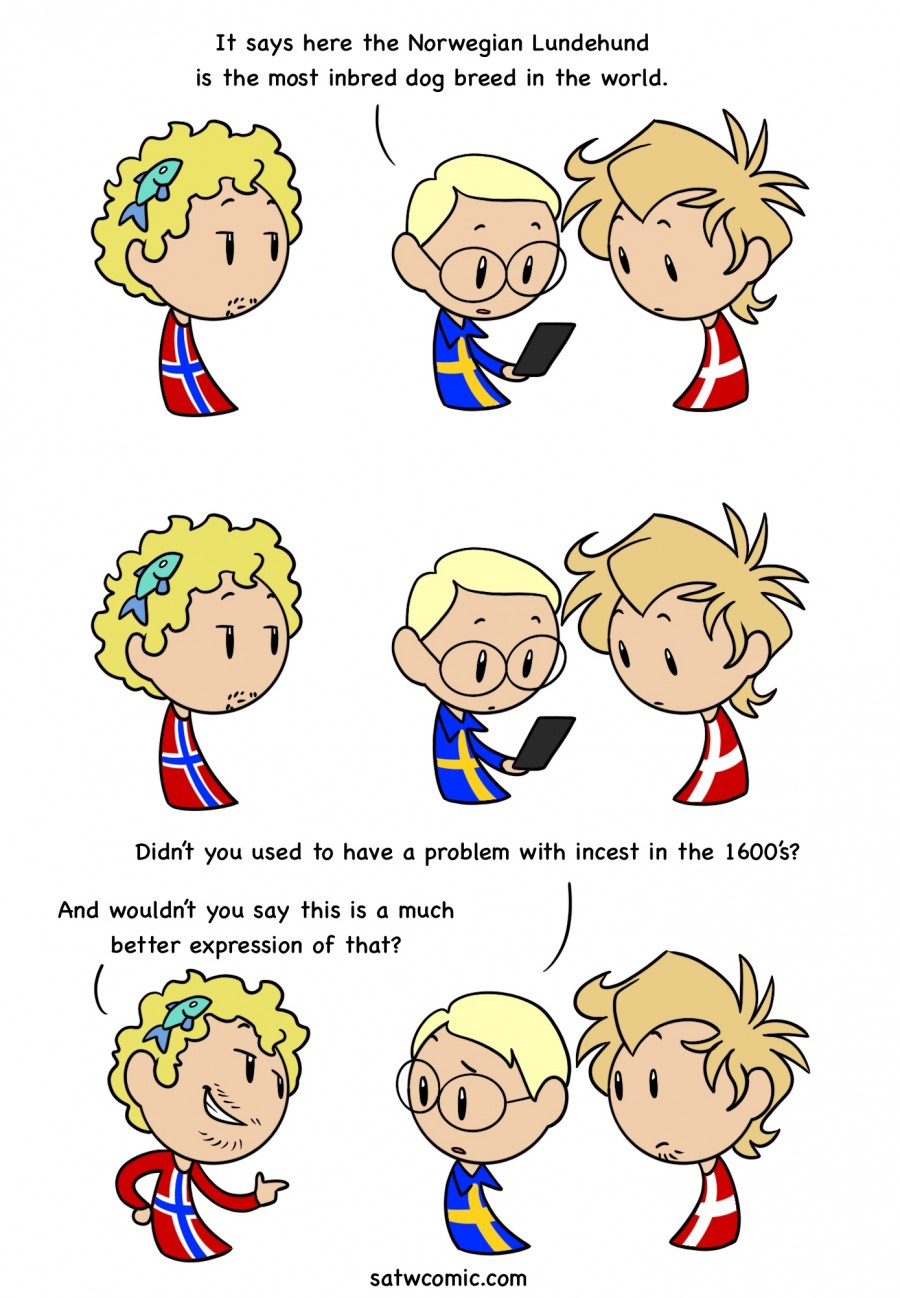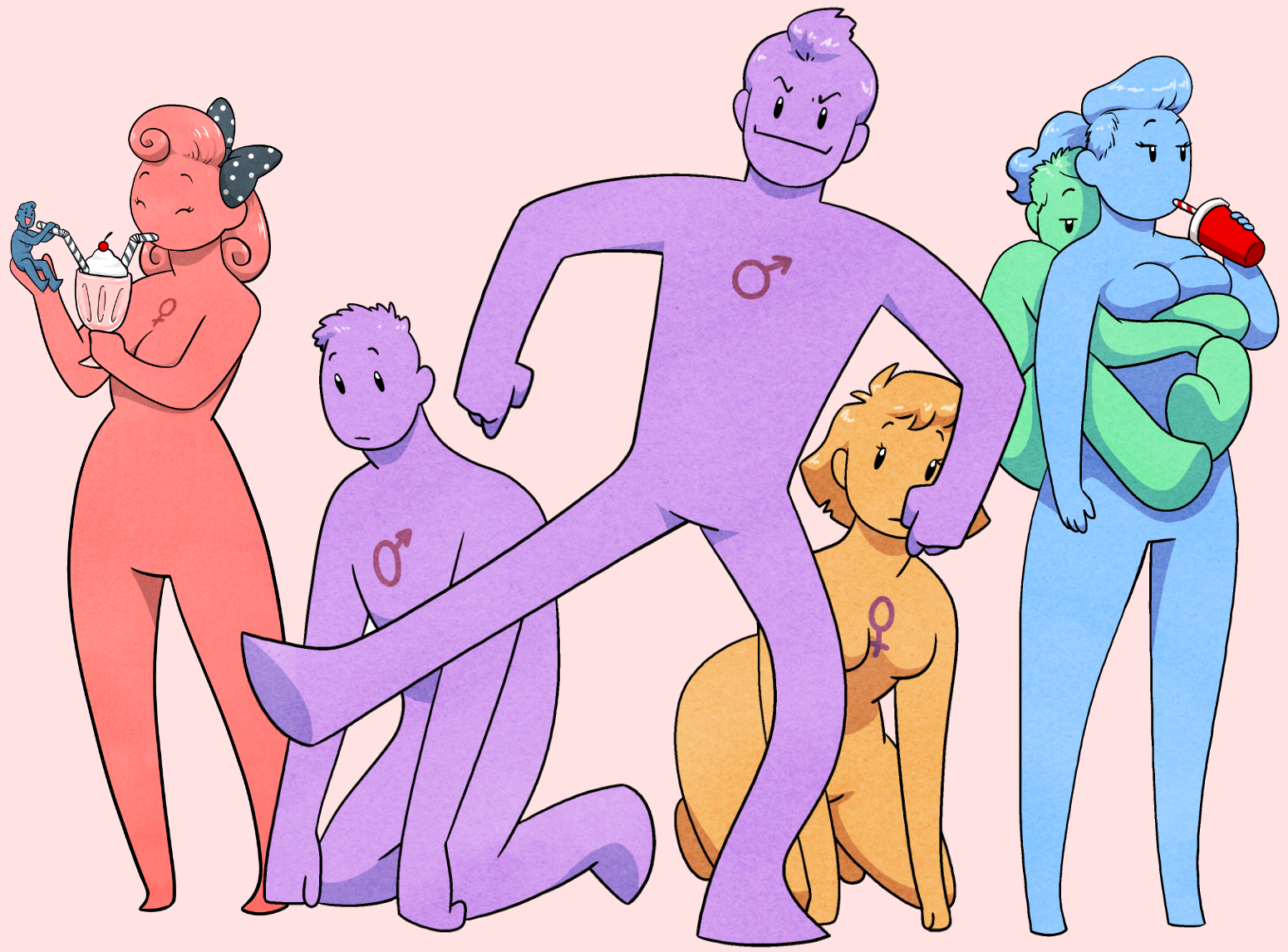6 years ago #9839755
6
4
Many nations still have this problem with incest.
In Saudi Arabia (and all the other Arabian countries such as Oman, Yemen, UAE, etc), the tradition is for the men to marry their father's brothers' daughters, i.e., their paternal cousins. Many people think this is a fine tradition and refuse to let it die, as it ensures there's more women for the clan, something that's extremely important in a country where polygyny is the norm which means that there simply aren't enough women to go around. Their historical 'solution' is to send the extra men Somewhere Else to cause trouble. A few of those men end up joining the Taliban, ISIS and similar, but as long as those young men are causing trouble Somewhere Else and not home, Saudi Arabia and the others don't care.
In Saudi Arabia (and all the other Arabian countries such as Oman, Yemen, UAE, etc), the tradition is for the men to marry their father's brothers' daughters, i.e., their paternal cousins. Many people think this is a fine tradition and refuse to let it die, as it ensures there's more women for the clan, something that's extremely important in a country where polygyny is the norm which means that there simply aren't enough women to go around. Their historical 'solution' is to send the extra men Somewhere Else to cause trouble. A few of those men end up joining the Taliban, ISIS and similar, but as long as those young men are causing trouble Somewhere Else and not home, Saudi Arabia and the others don't care.
6 years ago #9840312
3
1
Fun incest facts.
1. Every. Single. Gene required a ton of incest to go from an expressed mutation all the way to well actually having a place in the genome.
2. Slightly over half of everyone has an incest fetish. The other half however are EXTREMELY disgusted by it. And this seems to be determined by a mother inherited gene.
3. Back in the 1800s to the early 1900s incest was so fashionable that people would not only have faux romances with their siblings, but theaters would cast actors and actresses with the same last names into leading romantic roles with each other because just the suggestion of incest there would result in better ticket sales.
1. Every. Single. Gene required a ton of incest to go from an expressed mutation all the way to well actually having a place in the genome.
2. Slightly over half of everyone has an incest fetish. The other half however are EXTREMELY disgusted by it. And this seems to be determined by a mother inherited gene.
3. Back in the 1800s to the early 1900s incest was so fashionable that people would not only have faux romances with their siblings, but theaters would cast actors and actresses with the same last names into leading romantic roles with each other because just the suggestion of incest there would result in better ticket sales.
6 years ago #9842762
2
0
When most women got death sentences in the 1500’s and 1600’s for being witches in Norway, most Norwegian men got death sentences for incest. Isn’t history magical?
1550:
B. Norway: "Hey older Sis? Will you have sex with me?"
S.Norway1: "What? NO!"
B.Norway: "SHE'S A WITCH! BURN HER!"
(Roaring, crackling flames)
B.Norway: "whew! What a smell! Like cooking pork, almost! Oh well. Hey younger Sis? Will you have sex with me?"
S.Norway2: "...uuuuuh... I guess I'd better, hadn't I?"
B.Norway: "Yay!"
1550:
B. Norway: "Hey older Sis? Will you have sex with me?"
S.Norway1: "What? NO!"
B.Norway: "SHE'S A WITCH! BURN HER!"
(Roaring, crackling flames)
B.Norway: "whew! What a smell! Like cooking pork, almost! Oh well. Hey younger Sis? Will you have sex with me?"
S.Norway2: "...uuuuuh... I guess I'd better, hadn't I?"
B.Norway: "Yay!"
6 years ago #9841946
2
0
I think incest is highly exaggerated. It is true that too much incest will cause more genetic diseases but if we take the most famous example of the Habsburgs then you see that only after repeated cases of incest it becomes a problem.
For example In 1946 the Argentinian government imported fifty beavers from Canada. According to a June 2011 NPR report, 200,000 beavers are living in the area. That are 200.000 beaver from the same starting 50.
If incest was as big a deal as it is always made out to be these beavers would have gone extinct from all the diseases not flourish as they did.
For example In 1946 the Argentinian government imported fifty beavers from Canada. According to a June 2011 NPR report, 200,000 beavers are living in the area. That are 200.000 beaver from the same starting 50.
If incest was as big a deal as it is always made out to be these beavers would have gone extinct from all the diseases not flourish as they did.
6 years ago #9840672
2
0
Even more inbred than pure breed Leonberger who all descent from the same 8 dogs that survived WWII?
6 years ago #9840329
2
2
If a couple is incestuous, then it should be illegal to have kid, IE anyone who is a married/partnered with in whatever way incestuous couple both should be snipped and tied respectively.
If it's a gay incest then it doesn't matter at all.
You are also far less likely to have issues with cousins than with mom/dad or brother/sister so much so that some cousins are more genetically diverse than a total stranger in the same racial/regional area that you may meet.
It's fascinating how we knee-jerk react to thing rather than think about them and what consequences they have and how. However Humility's lovely post about facts saying that the extreme dislike or disgust vs not minding it at all is determined by the mothers genetic composition then it explains why for many it seems to be a split issue.
I still maintain that I don't care what anyone does as long as they aren't hurting anyone. This would also apply to other genetic risks like mental and physical health disorders that have medium to high risk of being passed to offspring. Since incest doesn't even have that high of a chance and as Tarmaque pointed out that the incest becomes an issue down the line when it continues rather than one instance of it I would say people are far more irresponsible if they have current genetically predicated issues mental and physical and still decide to have kids instead of adopt.
When you know your child will suffer from something you will have a very high chance if not absolutely will pass down, you are the gross one to me. But culture and morals are complete arbitrary nonsense and it's more okay for someone who has dwarfism, depression, eczema and a history of cancer in the family to have a kid, yet two related persons not having kids, but still being lovers, that's the real crime.
If it's a gay incest then it doesn't matter at all.
You are also far less likely to have issues with cousins than with mom/dad or brother/sister so much so that some cousins are more genetically diverse than a total stranger in the same racial/regional area that you may meet.
It's fascinating how we knee-jerk react to thing rather than think about them and what consequences they have and how. However Humility's lovely post about facts saying that the extreme dislike or disgust vs not minding it at all is determined by the mothers genetic composition then it explains why for many it seems to be a split issue.
I still maintain that I don't care what anyone does as long as they aren't hurting anyone. This would also apply to other genetic risks like mental and physical health disorders that have medium to high risk of being passed to offspring. Since incest doesn't even have that high of a chance and as Tarmaque pointed out that the incest becomes an issue down the line when it continues rather than one instance of it I would say people are far more irresponsible if they have current genetically predicated issues mental and physical and still decide to have kids instead of adopt.
When you know your child will suffer from something you will have a very high chance if not absolutely will pass down, you are the gross one to me. But culture and morals are complete arbitrary nonsense and it's more okay for someone who has dwarfism, depression, eczema and a history of cancer in the family to have a kid, yet two related persons not having kids, but still being lovers, that's the real crime.
6 years ago #9840134
2
0
The basic cause being that Norway until motorized transports was a pain to travel within.
Thus you married within the local valley/fjord/island or so (roughly how far a rowboat or carriage could take you in a day or two).
Also likely why so many are into genealogy as a "hobby".
Thus you married within the local valley/fjord/island or so (roughly how far a rowboat or carriage could take you in a day or two).
Also likely why so many are into genealogy as a "hobby".
Add comment: Please Sign in or create an accout to comment.




 Support the comic on
Support the comic on 

































28